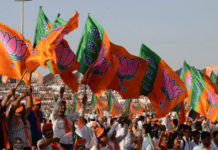
As predicted, US president Donald Trump has led his country out of the Joint Comprehensive Plan of Action (JCPOA) with Iran. The agreement that was supposed to increase international (read: Western) oversight into Tehran’s nuclear programme and hopefully rein in its nuclear ambitions, was one of the few unambiguously positive legacies of Trump’s predecessor, Barack Obama, but ran into opposition even during the delicate negotiations. Critics tried to add riders involving their pet projects — usually human rights or missile development — to the deal in an attempt to derail the process. Consistent with his pre-election criticism for once, Trump had called the JCPOA a bad deal and promised to repudiate it if elected. The US’ European partners — Britain, France, Germany — and Russia have parted ways with Washington and declared their intent to continue adherence to the JCPOA; China has so far been mute but already threatened with a trade war with the US, it is highly likely that it, too, will follow the rest in holding on to the Iranian nuclear deal.
It is not yet clear what the fallout of the American departure from the JCPOA will be. Although the rhetoric of the exit has been focussed on how the agreement did not go far enough in preventing Iran from pursuing nuclear weapons, the fact that Trump administration officials have stated that sanctions will be “snapped back” indicates that they believe Iran to be in breach of its obligations under the JCPOA — although most technical experts disagree with this evaluation.
Given that the other members of the E3 + 3 — particularly Britain, France, and Germany — will not be following the US example, the interesting question is if Washington intends to sanction their businesses and banks under the recently-passed Countering America’s Adversaries Through Sanctions Act (CAATSA) in the way India fears its defence dealings with Russia might. This would cause an enormous rupture in the US and world economy as China is the US’ single-largest trading partner and Britain, France, and Germany are together the fourth largest ahead of Japan.
Yet, if Trump does use his presidential discretion to waive sanctions and exempt these four countries, it would be too blatant an act of political hypocrisy if the same treatment was not extended to others over Russia and North Korea as well as over Iran.
In February 2018, Patrick Pouyanné, the CEO of the French oil and gas giant Total, openly called for the implementation of the 1996 European Union Blocking Regulation, a law that prohibited European firms from cooperating with foreign demands that are in violation of international law or hurt European sovereign interests. Denis Chaibi, a senior diplomat in the European External Action Service, commented that the EU was looking at a variety of options and the blocking regulations would not be difficult to implement.
Ultimately, these are political instruments and businesses would be hurt either by European penalties for obeying US sanctions or the denial of access to American markets due to US sanctions. Obviously, firms would prefer having access to the far larger American markets than pin their hopes on soaring Euro-Iranian trade and the threat of blocking regulations is empty. States are supposed to exercise restrain and caution, and a tit-for-tat exchange between the US and its three primary European allies will hurt everyone. More to the point, the multinational supply chains of most large industrial houses today means that there would be few European firms that are not exposed to the US and are free to do business with Iran.
Internationally, many countries will be pulled into the US wake for similar reasons; most countries are fairly integrated into the US economy and their national economies are not robust enough to withstand the loss of the American market. Additionally, others may have political reasons to reluctantly support Washington. India, for example, has been trying to purchase high-end American weapons systems and seeks Washington’s cooperation on several crucial issues such as defence technology and the geopolitics of the Indo-Pacific. It is most likely that India will have to bear the damage done to its own ambitions in Chabahar and the International North-South Trade Corridor (INSTC). Delhi will have even more to lose if Tehran responds to India’s distancing by handing the responsibility for the Shahid Beheshti port over to Beijing.
If India can persuade the US for a partial waiver on trade as it had done last time, its importance to Tehran would rise again only to the extent that other countries stop or reduce links with the Islamic republic.
Saudi Arabia, considered to be one of the beneficiaries of the American abnegation of the JCPOA, will enjoy, in the short-term, the spike in oil prices that is bound to follow Trump’s decision. However, this entire episode will have reiterated to Iran that the only way to be truly safe from American interference, as an Indian general is supposed to have observed after the First Gulf War in 1991, is to acquire nuclear weapons. Tehran seems to have been acutely aware of this note — Iran’s ambitions, as revealed by Benjamin Netanyahu’s recent document dump, were to posses just five nuclear warheads than an entire arsenal.
Riyadh has only managed to stoke Tehran’s determination and not douse it. The JCPOA was designed to give the international community breathing space to consider how best to dampen Iran’s love of the bomb — it was never meant to provide a permanent solution as there are none. As the non-proliferation experience has illustrated, the determined country will acquire nuclear weapons regardless of the financial and political costs to it and the willingness to pay such a high price will attract unscrupulous suppliers. The classic example of this is Pakistan, whose nuclear journey would have taken far longer had it not been for the generous acts of commission by China and of omission by the US.
Perhaps the greatest beneficiary of the American walkout is Israel. On the one hand, the reintroduction and expansion of sanctions hurts the Iranian economy and removes funds that might have otherwise gone to fund the Hezbollah and its adventures in Syria but on the other, the European and Iranian decision to continue observing the JCPOA keeps the checks on the Iranian nuclear programme in place for at least the next decade. If the archives reveal 30 years down the line that this was a game of good cop-bad cop, it would be a strategic masterstroke by Benjamin Netanyahu.
The one certainty at this moment is that Iran is not as isolated as it was prior to 2015.
Even if Europe falls in line with America’s wishes, Russia and China are both unlikely to go along with the West this time. Both countries have been antagonised by Trump’s sanctions and threats of a trade war to be receptive to cooperation. This opens the door for greater Russian and Chinese influence in West Asia. Russia also gains from the rift that has been created between Europe and the US over the Iranian nuclear programme.
In some ways, Trump has just given Iran’s hardline clerics a lease of life. There have been several signs that Iranians citizens are frustrated with their government and the poor economy. Some analysts were even hopeful of organic reforms that would gradually move the country from its extreme Islamic views. Trump’s abandonment of the JCPOA underscores everything hardliners warned against — that the US is not a trustworthy partner and it ultimately seeks the total subjugation of Iran.
If Washington expects Tehran to come back to the negotiating table, it may have a long wait. Rather than re-engage with a party that has shown bad faith, Iranian president Hassan Rouhani may simply choose to wait out his American counterpart in the hopes that Trump’s successor would be more amenable to the Obamaian status quo.
It is not clear what the Trump administration sought to achieve by leaving the JCPOA. If anything, it draws attention to the Iranian bogey in American minds and the ghosts of 1979 that such policies would have any support in the Houses of legislature or with the citizens. Pace the political acrobatics that are about to ensue over the coming days, the ultimate prize is the withering of the Iranian nuclear weapons programme. It is not clear if anyone in the White House had kept that in mind while thinking about abruptly walking out of an international treaty.

 India
India




















